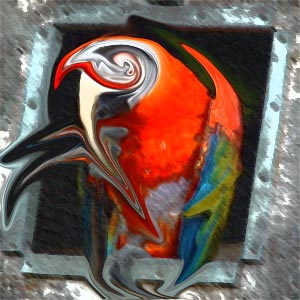Animal? Harsh I’d say, although Lefky did have what some might call animal ways. He broke a face or two—we all heard the stories. Jaws cracked, noses flattened. He was a soup-slurper, an onion-eater. He was my father.
Lefky’s favorite dish was a whole onion in one hand and half a loaf of torn bread in the other. He’d bite the onion as though it were an apple and dunk the bread in this bowl of meat-grease he called soup. The meat-grease would stick to his beard and Lefky’s dog, whatever alley mutt he’d have at the time, would feed from the beard.
One night Lefky came up the four rotting flights with a parrot. Tatteh, we said, using our Yiddish, can we teach it to speak? That’s the name we called him at home, never Lefky, the name you know from the posters, the ones that show him lifting the front of a beer wagon or applying his feared Russian bearhug. We were in the kitchen with the beat-up linoleum, the mousetraps, and the meat-grease bubbling on the stove. The mutt barked sharply at the parrot and never stopped, not for years, so many years, and the parrot found peace in only one place, the curl of Lefky’s fist. There he perched for as long as Lefky would let him, content at last. Even in its cage the parrot was terrorized. He would cringe in the upper corners as the dog menaced him, leaping and pawing.
This went on and on.
Tatteh, we said, why won’t the parrot speak words? The bird wouldn’t, would not say a single human word. He would only bark. Bark exactly like the mutt barked at him and flap away in terror when the mutt came after him, barking all the while. The chase lasted until past midnight, when Lefky turned in and the dog crept under the bed, right beneath him.
Finally, for its own good, Lefky decided to give the barking parrot away. The mutt he would never give up. He’d sooner give up one of us, we believed.
On the appointed day he had me come along with him. We carried the bird in its cage to the docks, where Lefky handed the cage to a deck hand on the old ferry, the heavy ferry that shuttled the harbor before they built the long, deep tunnel. Even in the open air, the man reeked of smoke. He shook hands and smeared fresh coal dust onto Lefky’s already-blackened sleeve. As the ferry pulled away we turned from the frothing stern, and the parrot cried out. But this time there was no bark. It was a single word the parrot spoke, screaming it again and again. He bent towards us and pushed his beak through the cage wires, crying Tatteh as we made our way down the wharf. Both of us tossed glances over our shoulders, then we turned our backs on him for good. He cried Tatteh until the wake of the ferry separated us forever, and the word swirled into the din of the gulls.



 In September 2022 SmokeLong launched a workshop environment/community christened SmokeLong Fitness. This community workshop is happening right now on our dedicated workshop site. If you choose to join us, you will work in a small group of around 15-20 participants to give and receive feedback on flash narratives—one new writing task each week.
In September 2022 SmokeLong launched a workshop environment/community christened SmokeLong Fitness. This community workshop is happening right now on our dedicated workshop site. If you choose to join us, you will work in a small group of around 15-20 participants to give and receive feedback on flash narratives—one new writing task each week.